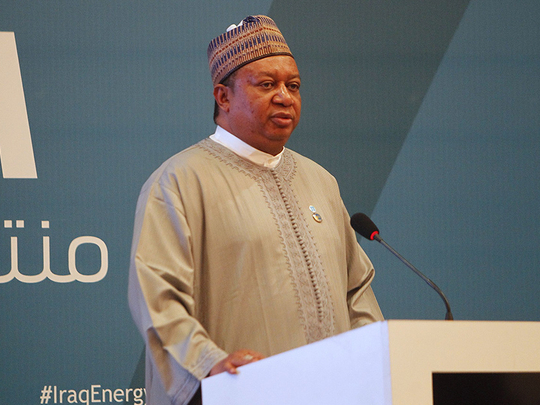
Abu Dhabi: Opec secretary-general Mohammad Barkindo on Wednesday urged US oil producers to work together with the oil cartel body to help stabilise global oil prices.
With the US having established itself as the largest oil-producing nation in 2019, and also as the world’s top oil exporter during the month of June, oil markets have looked on with concern regarding oversupply and an ever-growing presence of US shale.
Addressing the shale revolution, Barkindo struck a diplomatic tone saying Opec welcomed the new energy role of the US.
“We welcome the continued role of shale oil from the US, we welcome the new status of the US being the biggest producer of not only crude oil but liquids.
“With that comes responsibility; to maintain stable markets that is good for the US, producing companies in the US [and] consumers in the US,” he added. “It’s a shared responsibility, Opec alone cannot share that responsibility [and so] we invite the US to join us in this noble role and objective,” he said, encouraging US producers to join forces with Opec.
Barkindo highlighted Opec’s cooperation with non-Opec producers such as Russia and others as an example of how collaboration could bring stability to oil markets.
“The world should commend these 24 countries, diverse as they are coming together to ensure the stability and security of supply to consuming nations.
“You have seen the [compliance] numbers going up, 146 per cent compliance [in production cuts] in 2019 by all the parties together; this has to a large degree reassured the market,” he added.
Barkindo acknowledged an oversupply in the oil market during the first and second quarters of 2020, but also pointed out that additional cuts by Opec+ coming into effect this year would help to offset some of that surplus.
“Our first quarter projections showed an oversupplied market of about 700,000 barrels per day (bpd), in the second quarter it’s about 900,000 bpd. Our permutations showed that an additional adjustment [production cut] of 500,000 bpd over the [existing] 1.2 million bpd would almost keep the market in check.
“We have also realigned our demand numbers, they are basically around 1 million bpd … I think 1 million bpd is not robust but it is also not alarming,” he added, commenting on demand growth for 2020.












